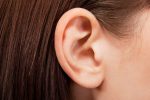How do you clean your ears then? Should you clean your ears at all? You might have heard the saying that you should never put anything in your ear smaller than your elbow. Is that really true?

Your ears produce a waxy substance called cerumen – or earwax – that naturally lubricates, cleans and protects your ears. When dirt, dust and other harmful things enter your ear, they get stuck in the wax so they can’t move further down into the ear canal. Chewing or otherwise moving your jaw shifts the ear wax to the outside of the ear, where it dries up and flakes off.
For most people, the ears do a great job of naturally cleaning themselves, says Dr. Mikhail Eiseler, a family medicine physician at Aurora Health Center in Mequon, Wis. In fact, using a cotton swab or other pointed object to clean the ear can cause more harm than good. That can push the wax farther into the ear canal, causing build up and blockage – called impaction – and even injury.
Every year, 12 million Americans see a clinician for removal of impacted earwax. Ear impaction can become worse if not treated, with symptoms including feeling like your ear is plugged, having difficulty hearing, experiencing irritation, itchiness, pain, tinnitus (ringing in the ears), dizziness, discharge or odor.
To ensure your ears remain clean and healthy, Dr. Eiseler offers this advice:
- Ideally, let nature do the cleanup.
- At the most, use a soft, moist cloth or cotton ball to wipe around the inside the ear, but avoid going into the ear canal.
- Don’t use cotton swabs, pens, keys, toothpicks or any other smaller-than-your-elbow items in your ear. These pointed objects can cause cuts that lead to infection, rupture the eardrum and even dislocate hearing bones, which can cause loss of hearing, dizziness or tinnitus.
- If you think you have impacted earwax, sometimes you can remove it yourself by softening it with a few drops of baby oil, mineral oil or glycerin or using an earwax removal kit commonly found in pharmacies and stores.
- Do not use hydrogen peroxide or ear candles. Ear candles are hollow candles that are intended to be inserted into the ear canal and lit at the exposed end, but studies show they are not effective and can cause burns and ear damage.
- If the recommended home methods don’t work, see your primary care physician to safely remove the earwax.



